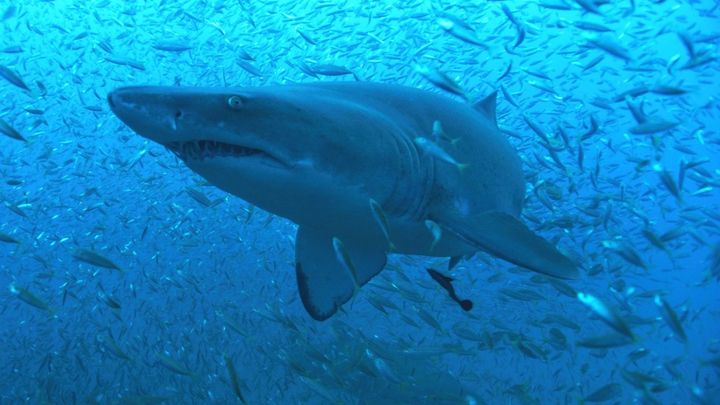
Shark Week
Tax deductible
Sharks, skates, rays and chimaera, are among the world's most threatened animals.
We need sharks to keep our oceans healthy and teeming with life. But human activity is pushing many species to the brink. Sharks and rays are particularly vulnerable to overfishing due to their biology. They:
ARE SLOW GROWING & LATE TO MATURE - as an extreme case the Greenland Shark can live ~400 years and doesn’t reach sexual maturity until ~150 years! Many are killed before they’ve produced offspring.
HAVE LONG PREGNANCIES - averaging between 9-12 months. The Greeneye Dogfish has the longest recorded pregnancy at 31 months!
PRODUCE FEW YOUNG - varying from 2 pups for the Bigeye Thresher and up to 135 for the Blue Shark. Compare this to the reproduction potential of bony fish who release millions of eggs.
MAY NOT REPRODUCE EVERY YEAR - some species have a resting phase of 1-2 years.
OVERFISHING
The biggest threat to sharks globally is overfishing. Each year many tens of millions of sharks are landed. Fuelled by a high demand for shark products. Sharks play vital roles in marine ecosystems. So, as shark populations rapidly decline around the world, so too does the health of our oceans
DEMAND FOR SHARK PRODUCTS
Shark meat and products can be found in restaurants, health food stores, supermarkets, pharmacies, fashion stores, souvenir and pet shops. Often consumers are unaware certain products contain shark, as it's not clearly labelled. Consumer awareness is key. The global trade in shark meat is on the rise. This is likely to far exceed any demand for fins, which are mainly sent to East and Southeast Asia. Shark Liver Oil (labelled squalene/squalane) - this can be found in a surprising number of products. From moisturisers, deodorants and sun tan lotion, to lip balm, lipsticks and other cosmetics. It's also used in vaccines, pills and supplements. The highest return of squalene comes from the livers of deep-sea sharks. And so, they're intensively fished. Due to the nature of their biology they're unable to withstand this level of fishing pressure. Many are now listed on the IUCN Red List of Threatened species.
SHARK FINNING
Shark finning is the process of cutting off the fins of a shark and discarding the body, often still alive, at sea. This wasteful and cruel practice contradicts all principles of sustainability. It also makes effective fisheries management impossible. It's illegal in many parts of the world, including Europe. But, weak legislation and ineffective enforcement often undermines shark finning regulations.
Now let's talk about Ocearch which is a very cool tracking site used to help gather information to help us conserve our oceans.
OCEARCH's mission is to accelerate the ocean's return to balance and abundance, through fearless innovations in scientific research, education, outreach, and policy, using unique collaborations of individuals and organizations in the U.S. and abroad.
If you want to donate to Ocearch yourself you can here : https://www.ocearch.org/donate-2/
We need sharks to keep our oceans healthy and teeming with life. But human activity is pushing many species to the brink. Sharks and rays are particularly vulnerable to overfishing due to their biology. They:
ARE SLOW GROWING & LATE TO MATURE - as an extreme case the Greenland Shark can live ~400 years and doesn’t reach sexual maturity until ~150 years! Many are killed before they’ve produced offspring.
HAVE LONG PREGNANCIES - averaging between 9-12 months. The Greeneye Dogfish has the longest recorded pregnancy at 31 months!
PRODUCE FEW YOUNG - varying from 2 pups for the Bigeye Thresher and up to 135 for the Blue Shark. Compare this to the reproduction potential of bony fish who release millions of eggs.
MAY NOT REPRODUCE EVERY YEAR - some species have a resting phase of 1-2 years.
OVERFISHING
The biggest threat to sharks globally is overfishing. Each year many tens of millions of sharks are landed. Fuelled by a high demand for shark products. Sharks play vital roles in marine ecosystems. So, as shark populations rapidly decline around the world, so too does the health of our oceans
DEMAND FOR SHARK PRODUCTS
Shark meat and products can be found in restaurants, health food stores, supermarkets, pharmacies, fashion stores, souvenir and pet shops. Often consumers are unaware certain products contain shark, as it's not clearly labelled. Consumer awareness is key. The global trade in shark meat is on the rise. This is likely to far exceed any demand for fins, which are mainly sent to East and Southeast Asia. Shark Liver Oil (labelled squalene/squalane) - this can be found in a surprising number of products. From moisturisers, deodorants and sun tan lotion, to lip balm, lipsticks and other cosmetics. It's also used in vaccines, pills and supplements. The highest return of squalene comes from the livers of deep-sea sharks. And so, they're intensively fished. Due to the nature of their biology they're unable to withstand this level of fishing pressure. Many are now listed on the IUCN Red List of Threatened species.
SHARK FINNING
Shark finning is the process of cutting off the fins of a shark and discarding the body, often still alive, at sea. This wasteful and cruel practice contradicts all principles of sustainability. It also makes effective fisheries management impossible. It's illegal in many parts of the world, including Europe. But, weak legislation and ineffective enforcement often undermines shark finning regulations.
Now let's talk about Ocearch which is a very cool tracking site used to help gather information to help us conserve our oceans.
OCEARCH's mission is to accelerate the ocean's return to balance and abundance, through fearless innovations in scientific research, education, outreach, and policy, using unique collaborations of individuals and organizations in the U.S. and abroad.
If you want to donate to Ocearch yourself you can here : https://www.ocearch.org/donate-2/
Organizer
Christina Sciorilli
Organizer
Mineola, NY
OCEARCH
Registered nonprofit
Donations are typically 100% tax deductible in the US.


